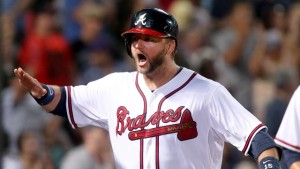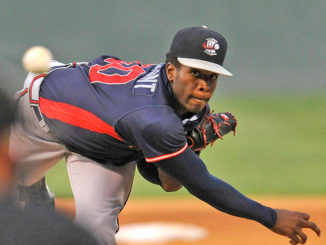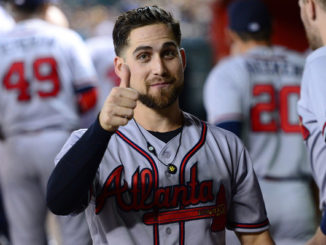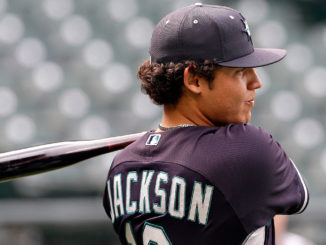The Atlanta Braves fired General Manager Frank Wren on September 22, 2014, marking the unofficial beginning of a dreaded – but needed – rebuild. In the nearly 11 months since, the Braves front office pulled off about every type of trade imaginable – and even some unimaginable, including the recent trade of Chris Johnson to the Indians.
What unifies the many and varied trades is the vision of building a winning team by 2017. That is why there is one non-trade that has me confused: A.J. Pierzynski.

Warming up to A.J. Pierzynski
Off the bat, I have to admit I was wrong about Pierzynski more than once: the first when news leaked from Honey Baked Ham that the Braves signed him, and the second when the Braves sent
Christian Bethancourt down to AAA to keep Pierzynski as the starter.
I was not excited about the signing initially because Pierzynski seemingly came to the Braves with no gas left in the tank after a “solid” and lengthy baseball career. Across more than 6,200 plate appearances from 1998 through 2012, he maintained a respectable-for-a-catcher slash line of .284/.324/.429 (94 wRC+).
In 2013, at the age of 36, it was the serviceable .272/.297/.425 (90 wRC+).
In 2014, at the age of 37, it had slid to just .251/.288/.337 (71 wRC+).
It was not hard to connect the dots between age, position, and diminishing production, and assume he had nowhere to go but down the career slope to retirement. The diminishing skills included his abilities behind the plate, which was never a real strength for him to begin with. Plus, he had the dreaded “attitude” label, although he comes across in interviews as a player people hate only if he plays on the other team.

I would bet all the zeros of dollars in my bank account that others had the same initial thought: the Braves signed a washed up, disliked, no-hit catcher who couldn’t play defense to be the primary back up and mentor for the young Christian Bethancourt, whose skills and maturity were also question marks. To sum, this was one of those “veteran presence” moves where the type of presence he would provide was a little questionable.
Then the craziest thing happened: Pierzynski started hitting… and hitting… and hitting.
Pierzynski was one of the best hitters in baseball in April, slashing .422/.442/.689. According to his 204 wRC+, during the month he created twice as many runs compared to league average. Fifty-two plate appearances do not a Hank Aaron make, but with Bethancourt’s struggles on both sides of the ball, and fan tendency to root for the “hot hand,” it did not take long for Pierzynski to slide past Bethancourt as the starter and as the fan base’s favorite catcher.
CinderPierzynski’s Fairytale Season
I kept waiting for the spell to break, for CinderPierzynski to turn back into a pumpkin. He lacked the track record to be THAT good, and old catchers tend to wear out more quickly anyway. A boom and bust was a reasonable expectation, and I was partially right. He did regress heavily in May, hitting worse than Bethancourt by quite a bit that month, and it wasn’t because Bethancourt was hitting well:
- Pierzynski May: .145/.197/.194 (7 wRC+) in 66 plate appearances
- Bethancourt May: .209/.227/.302 (34 wRC+) in 44 plate appearances
But the writing was already on the wall for Bethancourt. I do not think I’m exaggerating when I say everybody was frustrated with Bethancourt’s mythical defense being just that: a myth. So CB went to AAA, and AJ became not only the oldest starting catcher in the league, but a legitimate plus hitter. This marks the second time I was wrong. After the rough May, he hit well enough in June. Since the beginning of July, he has hit like an all-star, slashing .358/.393/.500 (147 wRC+). The fairytale continues….
Pierzynski: 2015 Monthly Splits
| Month | PAs | AVG | OBP | SLG | wRC+ |
|---|---|---|---|---|---|
| April | 52 | .422 | .442 | .689 | 204 |
| May | 66 | .145 | .197 | .194 | 7 |
| June | 84 | .275 | .310 | .413 | 99 |
| July | 82 | .359 | .390 | .500 | 147 |
| August | 30 | .357 | .400 | .500 | 146 |
So why Trade Pierzynski?
The question, then, is why? Why do I think the Braves made a mistake in not trading a guy who is A) a fan favorite, B) a stable force in the offense, and C) a real Cinderella story? I mean, who roots against a Cinderella story? NOT ME!
Please understand this point: Pierzynski has been great this season, and I am happy about it. But looking at the situation more broadly, his personal success is not actually benefiting the Braves. The team isn’t going to the playoffs this year, and Pierzynski isn’t going to be around (under the same contract) next year.
So what are the reasons CinderPierzynski should have been traded?
Trade Reason 1: His status in context of the rebuild.
A couple of weeks ago, I wrote about the Braves rebuilding process in an attempt to make sense of the trade deadline deals. In that article, I said part of the process is to “offer one-year contracts to veterans who have the potential to bounce back but won’t hurt the team’s future if they don’t. An added benefit is that bounce back veterans on cheap contracts – such as Kelly Johnson, Juan Uribe, and Jim Johnson – are very valuable to “win now” teams, such as the Mets and Dodgers.”
A.J. Pierzynski fits right into this group as a veteran player signed to a one year, $2 million contract. The Braves bought low and struck gold. As a fan, I am excited that he is doing very well at a low cost for my team. But when I step back and look at the process, it is clear that the Braves are not contenders this year, and Pierzynski is not a part of the plan for 2017. Be honest, 38 is like 100 in catcher years. In two years, he might be a fossil.
Short term, though, he has value. There are teams out there who are contenders this year and could use a very productive and cheap rental bat in a traditionally weak offensive position. These teams might sacrifice a bit more of a prospect than they normally would to solidify the current “win now” roster.

For instance, those Mets mentioned above have struggled at catcher because the talented Travis d’Arnaud continues to suffer random injuries (coincidentally, his most recent was an elbow sprain caused by a home plate collisions with Pierzynski). His backups have failed to produce, but primary backup Kevin Plawecki is a highly rated prospect. If traded to the Mets, Pierzynski could have solidified that position very cheaply for the Mets playoff run, and without interfering long term.
On the Braves side, the Mets might have offered a better prospect in the aforementioned trade of KJ and Uribe if Pierzynski were included.
A final selling point: with the Braves not in the playoff picture, I want to help the Mets shut the Nationals out of the playoff picture. Watching the “sure thing” Nationals sulk and whine and possibly implode would be very, very enjoyable, but I digress.
A better spot for a trade might have been an American League team with weak catching. Here the aging veteran could have received some additional plate appearances out of the DH spot. For instance, the Angels have a noticeable void in catcher offense, with Chris Iannetta and Carlos Perez combining to hit .202/.279/.314 (70wRC+).
The point is that there are playoff teams that would have benefited from Pierzynski, and that were likely willing to trade someone with more than a drop of future potential for him. If part of a package, it would have added value, and should have lead to an increase in quality of return prospects. I don’t know what happened behind the scenes, and maybe the Braves front office simply couldn’t make a trade work, but the latest rumor is that the Braves not only aren’t looking to move him this year, they are thinking about signing him for next year.
In context of the rebuild, keeping him to serve as a primary catcher the rest of this season is a mistake. If the Braves are determined in their heart to have Pierzynski next season, they could trade him AND re-sign him. Any potential in a prospect gained from a trade is better than the nothing gained from an expiring contract. In 2017, Pierzenski will not be a productive hitter for the Braves; he likely won’t even be playing.
Trade Reason 2: Delaying the development of Christian Bethancourt.

The bigger issue to me is 23-year-old Christian Bethancourt. I have said since last season that he needs big league experience in order to grow into his potential. I also said the initial year in the majors would likely be a rough one, but it would be needed.
I have heard the rumors that the Braves were looking for a catcher in a July trade, and the recent uncited comment from Mark Bowman that “it does not sound like the Braves believe the strong-armed backstop has shown great improvement with his glove or his pitch calling abilities,” though that runs counter to cited comments I reference below. If true, in my opinion, the Braves are not giving Bethancourt enough time to develop. They are free to get another catcher, and that catcher might be great going forward. Bethancourt may turn out to never amount to anything. But that wouldn’t change my opinion that he needs more – and more consistent – major league playing time before the Braves give up on the many years they have put into developing him.
Offensively, his bat has always lagged behind, but he was pushed through the system rather quickly for his age, never giving his bat time to catch up to the advanced level. In the few opportunities to repeat a level, he always hit better. That is the case again in AAA:
- 2014 AAA (365 PAs): .283/.308/.408 (94 wRC+)
- 2015 AAA (163 PAs): .309/.340/.447 (125 wRC+)
In the majors, his bat was also starting to improve. The monthly splits are small samples, but the key takeaway for me is that he showed painstakingly slow, but steady, progress. I would have liked to see what happened after a year of substantial play in the MLB.
Bethancourt: 2015 Monthly Splits
| Month | PAs | AVG | OBP | SLG | wRC+ |
|---|---|---|---|---|---|
| April | 39 | .135 | .179 | .189 | -2 |
| May | 44 | .209 | .227 | .302 | 34 |
| June | 21 | .286 | .286 | .429 | 96 |
My thought going into the season was that the Braves would not seriously be in the playoff picture. The silver lining would be Bethancourt having the opportunity to go through some rough developmental times in a low pressure environment, preparing him to break out next year (best case scenario, obviously).
The Braves did compete, which is great, but it wound up working against Bethancourt. All of his struggles on both sides of the ball mattered in the first half. That was only magnified by the easy comparison to the hot bat of Pierzynski.
I think most agree that this moment in the 8th inning of a June 11 game against the Padres was the real low point:
Bethancourt was sent down after his next start on June 14. In the end, I agreed it was in everyone’s best interest to send Bethancourt back to AAA. But he needed to go down for maturity reasons more than any specific performance issue.
The limited information out of AAA is that he has matured as a person and as a catcher. I was really optimistic after reading Minor League Catching Coordinator Joe Breeden’s comments on Bethancourt in a July 31st article posted on The G-Blog, Gwinnett’s official blog:
“Breeden said Bethancourt has the best arm he has seen for a catcher in his 28 years in professional baseball, but he was pleased to see the effort Bethancourt has put into his video study with Gwinnett pitching coach Marty Reed since he rejoined the G-Braves because the catcher position demands mental preparation and game-planning on the defensive side of the game that is similar to pitchers.
He said he was also was impressed to learn Bethancourt is now running the meetings the pitching staff has at the start of each series to go over the opposing hitters’ strengths and weaknesses.
‘That’s where, to me, he is really taking steps to get better,’ Breeden said.”
Based on this report, Bethancourt is not only willing to put in extra hours studying video to prepare for games, but also he now takes an active leadership role in working with the pitchers in game planning, which includes pitchers who are (or soon will be) pitching for the Braves. If he might be the catcher going forward, establishing that rapport is important.
The article also noted he allowed only one passed ball and committed one error to go along with a 44% caught stealing rate since returning to AAA.
The hope is that Bethancourt is turning potential into productive skills, and at 23 he still is young enough for such hope to be reasonable.
Arguably, he is making progress with the bat, with the glove, and with the head, but it is time to test all three back in the majors. I still believe he needs more time to develop at the major league level. The rest of this lame-duck season is the time to do it. With the Braves making rebuild-focused moves at the deadline, I fully expected Pierzynski to be traded and Bethancourt to be recalled. It fit perfectly into the bigger plan.
I do not assume Bethancourt is our catcher of the future, but I also am not rashly jumping to judgment that he is not. This is the mistake too many are making.
My issue is that the Braves are wasting precious time in seeing what they have in Bethancourt. With a two-year rebuild plan, the window is short to let him take his lumps and see if he can respond with growth. He has missed a lot of time this season taking a needed step back in June and July, but August and September are when he should have attempted to take another step forward. Not only would this allow him to develop at the major league level, but it would also allow the team to gather more data to determine whether a different “catcher of the future” is needed AND the time to pursue that catcher before 2017.
One Misstep in a Year of Forward Progress

Now that the non-waiver deadline has passed, the chances of moving Pierzenski are small to none (though never say “none” with this front office). It is doubtful that he cleared waivers (assuming he has already gone through the process) due to his production and no risk contract. Even as Braves fans slowly come to accept the reality of being out of the playoff picture, it would still be hard as a fan to accept Pierzynski taking a back seat to Bethancourt if he were called up. How can you justify relegating Pierzynski’s production to the bench? Bethancourt will likely be recalled in September, but in a backup role.
Considering all the options, the most beneficial direction for the future of the Braves was to move A.J. Pierzynski by July 31 for a piece with any future value, and let Bethancourt play. Let him show he matured. Let him show he can grow into the potential the Braves have nurtured for seven years – since he was a 16-year-old signing out of Panama.
Having said that, I want to conclude by putting my statements in context. The Braves have made a lot of moves, and I am still on board with what the front office has done. I can see how every move fits into the bigger picture, and I personally like most of the deals. John Hart, John Coppolella, and the rest of the front office have shown a lot of intelligence and creativity. It makes me confident they can pull off the plan to go from a muddled mess to legitimate contender in only two years.
But this is also why I am confused. As much as I like what Pierzynski is doing with the bat, keeping an aging catcher with an expiring contract to finish off a lost season is working against a plan the Braves in all other ways have been very clearly working toward – World Series contention in 2017.
In a nutshell, that is why not trading him is the Braves biggest misstep so far in a season that has seen a lot of forward progress.




I think the main fault with your logic is that this front office has written off Bethancourt. He has no future with this team. I also believe they have not been able to find any takers for him in the trade market but have tried to move him. Time will tell but he does not appear to have the talent we were led to believe.
Thanks for the comment. I’m sure there’s fault with my logic, but I’m not sure that is it. Why do you think the front office has written him off?
I have been disappointed with his defense, but his main struggle seems to be harnessing his potential due to some maturity issues. The athleticism is there and the skill areas in which he struggles are learnable.
He’s also hitting really well right now, which was his biggest knock coming up.
I would be very disappointed in the front office if they have written him off without giving him a real shot in Atlanta.
Thanks for reading and taking the time to comment. I’m not the author, but I do write here and wanted to address a point you made.
I don’t necessarily agree 100% with Micah’s point in the article, but I do think that, given where we are in this season and what our stated goal is, Bethancourt should be the regular starter for the rest of the year.
I don’t know if the front office has written off Bethancourt. We always have to assume that they are operating from the position of having more information than us. But even then, it would seem pretty that, if that is the case, they wrote him off very quickly.
I find it impossible to believe that they were unable to find any takers for a 23 year old highly regarded catching prospect. If nothing else, they could have gotten a different prospect for him. Rather, I think they were not able to find any takers *at their price*, if they were shopping him.
As to his talent…I don’t think talent was the problem. He’s always been one to adjust late, even in the minor leagues. He never got that chance here; he had 104 plate appearances as a regular catcher, and some of them were after he had lost the job. That would be like the Braves giving up on Glavine after 8 starts in 1988, when he was 1-6 with a 7.90 ERA.
Instead, I think Bethancourt was lazy and unmotivated to enter the season. He came into camp knowing the job was his, and perhaps took it for granted, and it showed in his play. The team rightfully benched him and then demoted him.
But since his demotion, he’s been a completely different player – even better than he was expected to be (at least with the bat). Here’s a good read on how he has been doing since being sent down:
http://atlantabraves.about.com/od/GeneralNews/fl/Christian-Bethancourts-Future-with-the-Braves-Improving.htm
There really is nothing at all to gain this season by continuing to start AJ. I love what he has done, but it is better for the long term plans of the organization to see if Bethancourt can handle the job. 27 games, about a third of which came after losing the job, are not a large enough sample size to tell.
Time seems to have shown that there was no future for Bethancourt here. I believe he has no future in baseball either because of laziness or because he was overrated. It is a shame because I believe the Braves made several critical mistakes because of its error in judgment on Bethancourt.